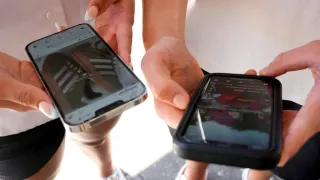July 23, 2017
Planning Panel OKs Sunset Pot Dispensary in SF
Sari Staver READ TIME: 7 MIN.
The Apothecarium is moving full speed ahead to open a new medical marijuana dispensary in the Sunset, following the July 13 San Francisco Planning Commission vote approving its proposal to renovate a former drug store at 2505 Noriega Street.
Despite hundreds of opponents attending the five-hour hearing, including dozens who held a news conference in front of City Hall, the commissioners voted 5-1 to allow the family-owned Castro-based Apothecarium to begin renovations on the storefront it has leased.
Commissioner Rodney Fong was absent.
Dennis Richards, a gay man who's the commission's vice president, was the lone no vote.
"I'm totally pro-Apothecarium and have always supported them," Richards said in a phone call with the Bay Area Reporter Monday. "But with legislation expected soon that would call for MCDs [medical cannabis dispensaries] to be first in line to be approved to sell cannabis for adult use, I thought it would be preferable to postpone the vote until the Board of Supervisors considered" the legislation regulating recreational use, approved by Proposition 64 last year.
The opponents, largely elderly Chinese people, argued that an MCD would endanger children, annoy the elderly, and harm the quality of life in the neighborhood by attracting a criminal element.
But those testifying in favor of the proposal argued that the Apothecarium's first location, at 2029 Market Street, has had no such effect and that the Sunset voters have, in fact, repeatedly voted overwhelmingly in favor of liberalizing local cannabis laws. Apothecarium officials presented the commission with more than 1,500 letters of support, including 111 from residents living within 1,000 feet of the proposed site.
Commenting on the commission's approval, Dr. Floyd Huen, medical adviser to the Apothecarium and a co-owner of the new Sunset facility, said in a prepared statement that the decision "was a huge victory for Sunset cannabis patients."
Huen's wife, former Oakland Mayor Jean Quan, is also co-owner of the new dispensary.
"Health care happens in-person. Patients deserve a well-run dispensary in their own neighborhood where they can receive consultations about their medication and dosage," Huen said in the statement.
He also said the dispensary plans to incorporate other medical components.
"The vision for the Apothecarium Sunset is unique: a bilingual (Cantonese), bicultural facility that works in tandem with traditional Asian medical practices such as acupuncture and Chinese herbs," Huen said.
Ryan Hudson, co-founder and executive director of the Apothecarium, said, "I want to thank the planning commissioners for their support of medical cannabis patients and the Apothecarium. I'd also like to thank the dozens of Apothecarium patients and supporters who came out to speak on our behalf before the commission. Many waited for hours to tell deeply personal stories about the positive impact medical cannabis and our dispensary have had on their lives."
The new facility is expected to open in 2018.
Appeal Possible
The opponents are allowed to appeal the commission's decision to the Board of Supervisors. Repeated attempts by the B.A.R. to contact them were unsuccessful. At press time, nobody had publicly announced an intention to appeal.
The night before the hearing, District 4 Supervisor Katy Tang, who represents the neighborhood where the planned MCD would be located, submitted a letter with "a few issues" about the proposal. Tang did not share her position on the MCD, because the commission's decision is appealable to the Board of Supervisors.
In her letter to the commission, Tang cautioned that a new dispensary could draw additional traffic to the neighborhood, possibly causing safety issues. Tang also criticized the Apothecarium for using "offensive" tactics in conducting outreach in the Sunset, pointing to an op-ed piece in the San Francisco Examiner by the president of the Castro Merchants association attempting to link her to the anti-LGBT Pacific Justice Institute, a group she met with earlier this year.
"The project sponsor's constant reference to our office and its alleged association with the Pacific Justice Institute has been absolutely offensive," she wrote.
But Apothecarium attorney M. Brett Gladstone, a partner and head of the land use practice at Hanson Bridgett LLP, took issue with Tang's letter.
"The Apothecarium has not, and will not, talk about an association between the Pacific Justice Institute and the supervisor's office," said Gladstone.
Gladstone pointed out that the Apothecarium hired a well-known transportation consultant, Fehr and Peers, to prepare a parking and traffic study as part of its application, "to our knowledge ... the first time an MCD has ever done a third party produced parking and traffic study as part of an approval hearing."
The consultant found that any parking needs triggered by the new MCD are expected to be fewer than that of the average retailer along Noriega Street, including the average restaurant - the most common, said Gladstone. The report also found that the estimated number of vehicle trips during peak hours could be accommodated by the existing available parking supply within 1,000 feet of the proposed MCD site.
Opponents Speak
At the hearing, dozens of the opponents spoke out in opposition.
Ray Hacke, an attorney with Pacific Justice Institute, a right wing anti-LGBT hate group, objected to the establishment of an MCD near a preschool. According to Hacke, the private Ark of Hope Christian preschool and day care is within 600 feet of the proposed dispensary.
"Children should be kept as far as possible" from illegal drugs, he said, pointing out that although Prop 64 legalized adult use of recreational cannabis in California, it is still illegal under federal law.
In addition, said Hacke, the "cash on hand" in a dispensary will attract "criminal elements" to the neighborhood. Also, Hacke said that individuals could purchase cannabis from the dispensary, then resell it on the street, promoting the "evils of drug trade" in the Sunset.
Hacke told the commissioners that if they approved the new Apothecarium dispensary, they would be "facilitating" a federal crime.
"You are on notice that we will hold you accountable," he said.
Hacke compared an MCD to a bar, tavern, or an adult bookstore or movie theatre, all of which, he said, should be located where they will have the "least effect on children."
Frank Lee, the president of the Organization for Justice and Equality, another right-wing group, said that parents have told the owner of the Ark of Hope preschool at 2701 Noriega Street that they are already looking for other facilities for their children to attend, if the MCD is approved.
"How can you impose this on our children?" Lee asked the commissioners rhetorically. Many businesses in the Sunset will have to close, he predicted, because customers will no longer want to come into the area with an MCD.
"Why are profit-oriented companies given priority over children and minorities?" he asked. If San Francisco approves this MCD, the city's image "will be tarnished" and objections to the decision "will drag on for years in the courts," he predicted.
Bernie Chung, senior pastor of the San Francisco Chinese Baptist Church, 1811 34th Avenue, said that smoke from marijuana "permeates further" than cigarette smoke and is especially difficult for the elderly to tolerate.
"Young people can just hold their breath for 10-15 seconds" to avoid breathing the smoke, but the elderly cannot, he said. Also, because cannabis is already "accessible by mail order," he said, dispensaries should be located "in areas where more people" need them.
Lynn Fox, a member of the emeritus faculty in the department of secondary education at San Francisco State University, said she has been part of the movement to create drug-free schools and communities for the past 35 years. Fox pointed out that some 500 Sunset residents had spent over five hours at the hearing, asking the commissioners to "protect the children." None of these people, she noted, is getting any sort of financial benefit for appearing at the hearing.
Fox said research indicates that adolescents will get involved with drugs "if they think it's harmless and readily available." If a sixth or seventh grader tries marijuana, they are at risk for addiction, she said.
"The sooner they use, the sooner" they can get addicted, she added.
"Marijuana is one of the worst drugs out there," she said, and has been proven to lead to earlier addiction. The use of marijuana can affect a child's IQ and can adversely affect problem solving, violence, and bullying behavior, among other things, she said.
"If it's accessible, they'll use it. And they won't get high. They'll get stoned out of their mind," she said.
Supporters Tell Their Side
But Apothecarium supporters told another side of the story.
Brianna Scott, Ph.D., who teaches psychology at Santa Rosa Junior College, said there is no evidence that state laws legalizing cannabis had any correlation to increased use by adolescents. Increased use by children and adolescents is linked to parental use, she said.
"Children learn from modeling ... not from storefronts" where medical cannabis is sold, she said.
Charles Yingling, Ph.D., a neuroscientist and professor at UCSF, submitted testimony about his role as a caregiver for a friend suffering with stage 4 cancer.
Yingling, who has lived near the proposed dispensary for many years, said that having a location in the Sunset would help his friend, who uses medical cannabis to treat her pain and has difficulty traveling to obtain her medicine.
"As a caregiver, I have gone to the Apothecarium on Market Street, which is an outstanding example of what a pharmacy should be, but the location is inconvenient for us," he said.
Joseph Ewald, a recently discharged veteran, testified that cannabis can be used to "save veterans from addiction." Ewald said he had a friend who, after discharge, turned to heroin use and died, after getting addicted to opioids they were prescribed to treat service-related injuries.
The arguments made by the opponents at the hearing have been filled with "misinformation and lies," he said, noting that the Apothecarium is fully in compliance with all laws and has established a program geared to help veterans.
Ewald urged the commissioners to "rise above this madness and honor the spirit of San Francisco by supporting the Apothecarium and making this business a reality."






